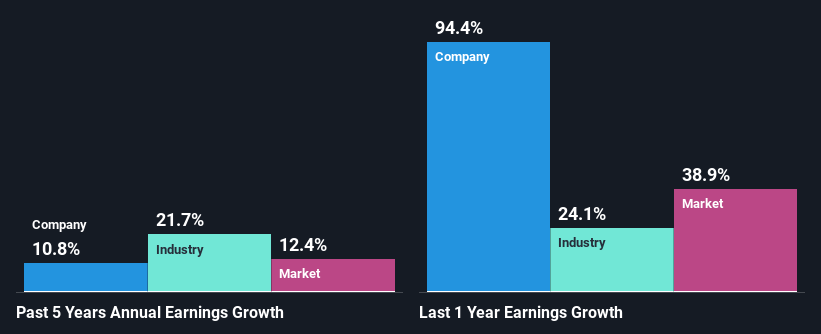Is Magic Software Enterprises Ltd.'s (NASDAQ:MGIC) Recent Stock Performance Influenced By Its Fundamentals In Any Way?
Most readers would already be aware that Magic Software Enterprises' (NASDAQ:MGIC) stock increased significantly by 15% over the past three months. We wonder if and what role the company's financials play in that price change as a company's long-term fundamentals usually dictate market outcomes. Specifically, we decided to study Magic Software Enterprises' ROE in this article.
ROE or return on equity is a useful tool to assess how effectively a company can generate returns on the investment it received from its shareholders. In other words, it is a profitability ratio which measures the rate of return on the capital provided by the company's shareholders.
Check out our latest analysis for Magic Software Enterprises
How Is ROE Calculated?
Return on equity can be calculated by using the formula:
Return on Equity = Net Profit (from continuing operations) ÷ Shareholders' Equity
So, based on the above formula, the ROE for Magic Software Enterprises is:
11% = US$34m ÷ US$298m (Based on the trailing twelve months to June 2021).
The 'return' is the yearly profit. Another way to think of that is that for every $1 worth of equity, the company was able to earn $0.11 in profit.
Why Is ROE Important For Earnings Growth?
We have already established that ROE serves as an efficient profit-generating gauge for a company's future earnings. Depending on how much of these profits the company reinvests or "retains", and how effectively it does so, we are then able to assess a company’s earnings growth potential. Generally speaking, other things being equal, firms with a high return on equity and profit retention, have a higher growth rate than firms that don’t share these attributes.
Magic Software Enterprises' Earnings Growth And 11% ROE
To begin with, Magic Software Enterprises seems to have a respectable ROE. And on comparing with the industry, we found that the the average industry ROE is similar at 12%. This certainly adds some context to Magic Software Enterprises' moderate 11% net income growth seen over the past five years.
As a next step, we compared Magic Software Enterprises' net income growth with the industry and were disappointed to see that the company's growth is lower than the industry average growth of 22% in the same period.
The basis for attaching value to a company is, to a great extent, tied to its earnings growth. What investors need to determine next is if the expected earnings growth, or the lack of it, is already built into the share price. This then helps them determine if the stock is placed for a bright or bleak future. What is MGIC worth today? The intrinsic value infographic in our free research report helps visualize whether MGIC is currently mispriced by the market.
Is Magic Software Enterprises Making Efficient Use Of Its Profits?
The high three-year median payout ratio of 79% (or a retention ratio of 21%) for Magic Software Enterprises suggests that the company's growth wasn't really hampered despite it returning most of its income to its shareholders.
Additionally, Magic Software Enterprises has paid dividends over a period of nine years which means that the company is pretty serious about sharing its profits with shareholders.
Summary
Overall, we feel that Magic Software Enterprises certainly does have some positive factors to consider. The company has grown its earnings moderately as previously discussed. Still, the high ROE could have been even more beneficial to investors had the company been reinvesting more of its profits. As highlighted earlier, the current reinvestment rate appears to be quite low. Having said that, looking at the current analyst estimates, we found that the company's earnings are expected to gain momentum. To know more about the company's future earnings growth forecasts take a look at this free report on analyst forecasts for the company to find out more.
This article by Simply Wall St is general in nature. We provide commentary based on historical data and analyst forecasts only using an unbiased methodology and our articles are not intended to be financial advice. It does not constitute a recommendation to buy or sell any stock, and does not take account of your objectives, or your financial situation. We aim to bring you long-term focused analysis driven by fundamental data. Note that our analysis may not factor in the latest price-sensitive company announcements or qualitative material. Simply Wall St has no position in any stocks mentioned.
Have feedback on this article? Concerned about the content? Get in touch with us directly. Alternatively, email editorial-team (at) simplywallst.com.

